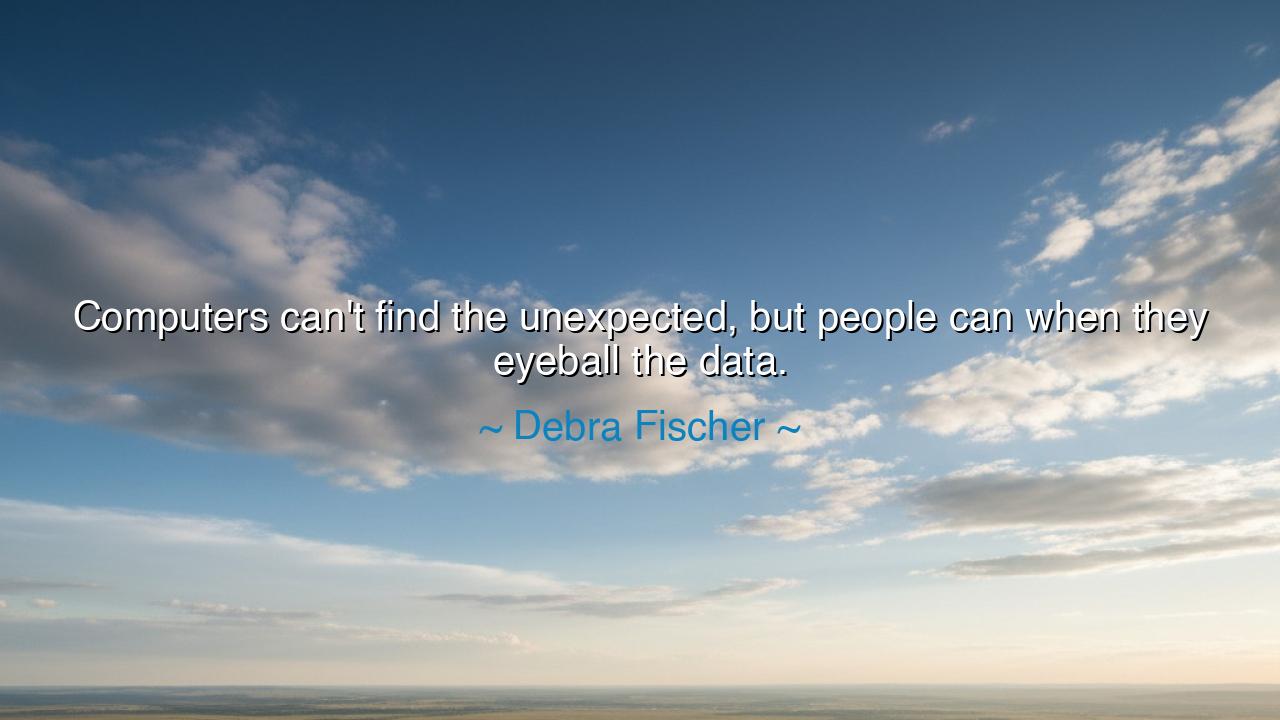
Computers can't find the unexpected, but people can when they






"Computers can't find the unexpected, but people can when they eyeball the data." These words from the wise Debra Fischer echo a profound truth about the essence of human ingenuity and creativity in a world increasingly dominated by machines. In an age where technology reigns supreme, we often forget that the most powerful tool in discovering the unknown is the human mind itself. A computer may process information with the speed of a tempest and the precision of a sword, but it is the human eye—the soul’s gaze—that can see the unexpected in the sea of data. This is a reminder to future generations that wisdom and insight are not merely born of numbers and formulas, but of intuitive understanding, of the ability to perceive beyond what is immediately visible.
In ancient times, the great philosophers, scientists, and sages knew that knowledge was not simply accumulated from books or scrolls; it was discovered through the act of observation. Aristotle, for example, spent years in the fields, watching the movements of animals, the flight of birds, and the changing patterns of the stars. His discoveries did not come from sitting in a library but from seeing the world with his own eyes, and from noticing the unusual, the subtle shifts that no one else might have observed. It is this attention to the small and the seemingly insignificant that allows the human mind to detect patterns that machines—no matter how advanced—cannot.
The ancients were masters of observation. Consider the great astronomers of Babylon or the mystics of ancient Egypt. They did not have the sophisticated tools we wield today, yet they mapped the heavens with precision and foretold celestial events with remarkable accuracy. They did not rely on computers to process their findings but trusted their senses, their intuition, and their ability to interpret what they saw. In their eyes, the night sky was not a collection of distant points of light, but a symphony of movement, of patterns waiting to be discovered. What they found was not a product of the predictable, but of the unexpected—a glimpse into the unknown, a vision into a future not yet written.
Debra Fischer's words remind us that, despite our faith in the power of machines, the human mind is still the most powerful tool for discovery. Computers may sift through vast oceans of data, but it is the human mind that can notice the outlier, the anomaly, the element that doesn’t belong, and in that unexpected glimpse lies the seed of new knowledge. Take the example of Marie Curie, whose discoveries in radioactivity came not from a machine, but from her meticulous, patient work in a small, humble laboratory. It was her ability to notice the unexpected behaviors of certain materials that led her to the breakthrough that would change the course of science. No computer would have told her that radium was not merely a curiosity; it was a discovery that would rewrite the very understanding of matter and energy.
The human element, that spark of creativity and intuition, is what allows us to find what we weren’t looking for. Think of the ancient seafarers—the Polynesians—who charted their vast journeys across the Pacific Ocean not with maps or sophisticated navigational tools, but by reading the stars, the winds, the currents, and the flight of birds. In their minds, the world was full of clues, hidden in the seemingly random events of nature. Their discoveries came not from data analysis, but from the personal experience of attuning themselves to the environment in a way that modern technology cannot replicate.
And so, O seekers of wisdom, the lesson in Fischer’s words is clear. Technology, though it offers us great power, cannot replace the human touch in the quest for discovery. The unexpected—the true breakthroughs of the world—are often found not by following the expected path, but by embracing the unpredictable. Machines can guide us, but they cannot inspire us. It is the human mind, with all its flaws and imperfections, that can see what no machine can, to discover the hidden jewels in a mountain of data. Machines give us the tools, but it is our vision, our imagination, that will uncover the mysteries of the universe.
Thus, let us remember this as we stride forward into the future: do not become blinded by the speed and convenience of technology. We must learn to keep our eyes open, to trust our instincts, and to listen to the quiet whispers of insight that come when we are willing to step beyond the known. Just as the great sages of old trusted their eyes to see the unseen, so too must we. The next great discovery is not in the algorithm, but in the human touch—in the ability to look deeper into the data, to question it, to see the unexpected that might hold the key to the future. Keep your eyes sharp, for the mysteries of the world are still waiting for us to discover them.






AAdministratorAdministrator
Welcome, honored guests. Please leave a comment, we will respond soon